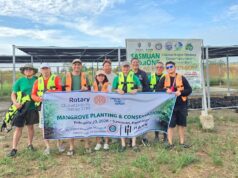CABANATUAN CITY (PIA) — The Department of Health (DOH) is reminding the public to practice healthy road habits.
This is in line with the observance of Road Safety Month this May by virtue of Proclamation No. 115-A, series of 1966.
Central Luzon Center for Health Development Environmental and Occupational Health Cluster Head Lianne Marie Calimutan said DOH aims to raise awareness regarding road safety to prevent injuries caused by road accidents, as these can lead to catastrophic health outcomes.
“1.35 million people die each year worldwide due to road accidents, according to the World Health Organization. It is estimated that 12,000 Filipinos die each year due to road accidents, according to the Philippine Statistics Authority,” she disclosed.
In Central Luzon, the total number of recorded road traffic deaths last year was 928 with a mortality rate of 7.30 percent.
Given these, DOH strongly advises the public to practice healthy road habits, such as wearing helmets, seatbelts, and child restraints when there are children on board; avoiding driving under the influence of alcohol; crossing at designated crosswalks or pedestrian lanes; knowing the speed limit on the road; and following traffic signs.

Calimutan emphasized that these behavioral practices on road safety will prevent unnecessary accidents and deaths.
Apart from these road habits, DOH also gave tips on what to do in case of a road accident.
First, it is advised to secure oneself and check for any immediate danger before leaving the vehicle.
“Get the first aid kit or any item that can be used for first aid. Turn on the hazard lights and, if possible, install the early warning device before leaving the vehicle. Take your mobile phone and do not forget the power bank in case charging is needed,” Calimutan noted.
Second, seek help from others to contact emergency services.
Third, assess the nature of the accident, whether it is a car accident or involves other vehicles such as motorcycles. Check who is seriously or slightly injured at the accident scene.
And lastly, it is important to prioritize who should be given first aid immediately. (CLJD/MAECR, PIA Region 3-Nueva Ecija)





